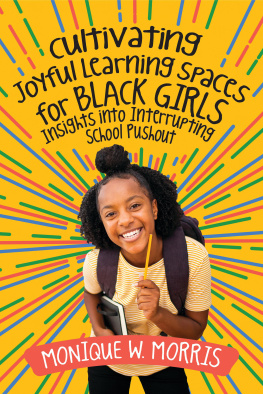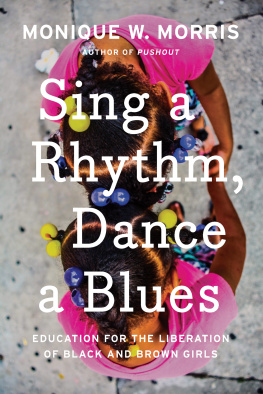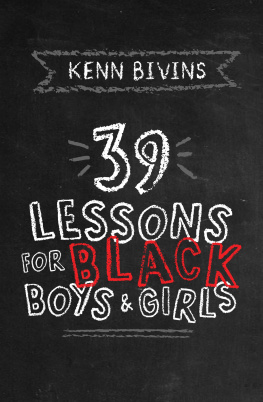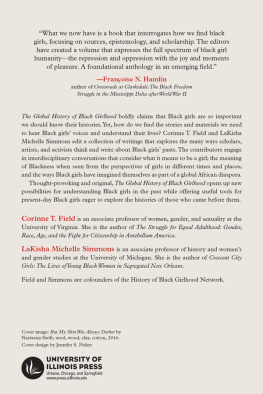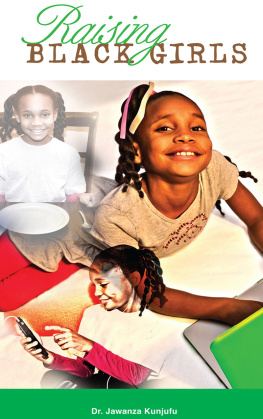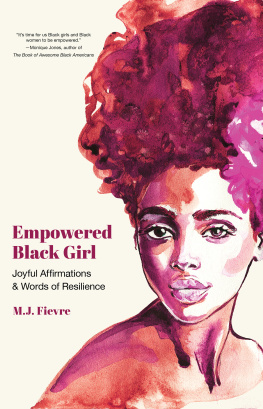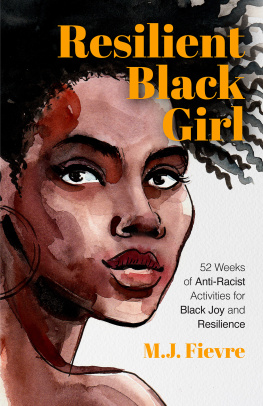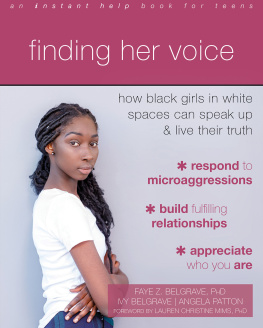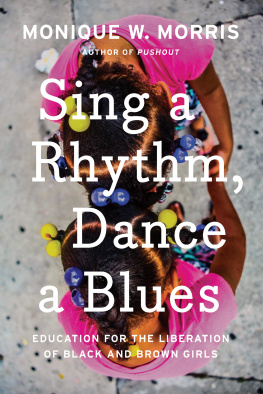Contents
Guide
Pages for Cultivating Joyful Learning Spaces for Black Girls
Dedication
....................
For those on the journey to educational justice and freedom work.
Acknowledgments
....................
I start my acknowledgments by thanking my ancestors and elders, whose journeys continue to inform my purpose on this earth. To my mother Katie Couvson, your unwavering support always gives me the strength to move forward. I would also like to thank my daughters Ebony and Mahogany, who have demonstrated grace and understanding for their mother, who is perpetually seeking ways to expand the village of care for Black girls and other girls of color. To my sister Dominique Fulling, thank you so much for helping me organize transcripts. You are always there when I need you. To my sister Yvette Couvson, your song for Sing a Rhythm, Dance a Blues helped to inspire some of the thinking for this project. To my brothers Donte Couvson and Xavier Couvson, I love you. To my sister Felicia Bailey-Carr, your commitment to learning as a school leader inspires me. Family, thank you!
It may go without saying that since 2020, U.S. schoolsand the educators and children who work in and attend these institutionshave experienced some of the most challenging conditions of the century. The COVID-19 pandemic was not only a global health challenge, but also a shared trauma that disproportionately impacted communities of color due to the legacy of medical racism, misinformation, and structural inequities that predisposed people of color to conditions that placed them at elevated risk of contracting the disease. Schools were thrust into remote learning, relying on technology that was inconsistently available, amid the uncertainty and fear that accompany a new deadly disease. For girls of color and their communities, navigating these conditions amid the ongoing racial violence and trauma that brought public protest to a peak in the summer of 2020 meant that girls of color, particularly Black girls, were thrust into deep vulnerability. In 2020, I also experienced a significant life change and stepped into a new position in philanthropy, which required organization building and the development of an urgent effort to resource the unique needs of girls and femmes of color across the country. The patience of my literary agent, Marie Brown, and the editorial team at ASCD, especially Susan Hills, during this tumultuous time was so deeply appreciated. Thank you!
This book would not have been possible without the many educators who have been willing to conference with me, honestly wrestle through hard questions with me (and each other)in person and by videoconference. I offer a special embrace to the three scholars who were willing to sit with me and share their brilliant insights for this book. Thank you, Janice Johnson Dias, Venus Evans-Winters, and Kakenya NtaiyaI am so grateful for all that you bring to the world. Thank you!
Lastly, I wish to extend my deepest gratitude to my sorors of Delta Sigma Theta Sorority, Inc. You all are my rock. I am always so grateful for my community that supports me and my vision for this work, especially my New Yorkbased loved ones, who were by my side while working through the material for this book. A special shout-out to the team at Grantmakers for Girls of Color and the #1Billion4BlackGirls Campaignyou all are the best. There is no other community with whom I'd rather mobilize resources for girls and femmes of color. Let's continue to do this!
Chapter 1
The Framework
Schools as Locations for Healing
....................
Teach me about what teaches you.
Malidoma Patrice Som, The Healing Wisdom of Africa
Educators are purveyors of information that is transferred via pedagogy intended to reach a cross section of culturally and linguistically diverse students. They are also often first responders to students in crisis, which invites them to do more than simply convey information but rather to embrace the full child in holistic learning about not only subject matter but also who they are and what they contribute to their communities.
In my book Pushout: The Criminalization of Black Girls in Schools, I describe how historical legacies of oppression and hyperpunitive, contemporary frameworks for safety in schools can foster learning conditions that weave schools into the tapestry of harm in Black girls' lives. From this discussion, and other studies examining the differential treatment of Black girls in schools, researchers have mapped the racialized gender bias that denies them access to instruction, unveiled differential enforcement of dress code policies that affect whether girls are allowed to attend school, and explored other surveillance and use-of-force measures that threaten Black girls' physical safety in schools. These policies, practices, conditions, and prevailing ideas about Black girlhood are what I have referred to as "school-to-confinement pathways," and they often justify educators' deep inquiry into combating pushout as an essential professional inquiry, as well as a moral and educational imperative.
School-to-Confinement Pathways
COVID-19 has dramatically altered the landscape of educational practices, expanding the United States' capacity for remote instruction. However, girls and femmesyoung people who identify their gender along a continuum or as nonbinary and express in a traditionally feminine mannerwho identify as Black, Indigenous, Latina, Asian, Pacific Islander, Arab, or other people of color have faced "difficulties adjusting to changes in the educational process, including inequitable access to reliable technology for distance learning, teacher support to address learning challenges, and reduced access to critical social and health services and supports normally provided within school settings."
Even in these conditions, Black girls remain the only group of girls who are disproportionately overrepresented across the spectrum of discipline at every educational level. (According to a recent study by the Georgetown Law Center on Poverty and Inequality, the racial disparity in discipline is greater among girls than among boys. Although an increasing number of schools are developing alternative practices designed to divert students from exclusionary discipline, racial disparities persist among those who remain along the pathways to confinement. Stated simply, even though fewer students may experience exclusionary discipline, those who do are disproportionately Black.
School-to-confinement pathways for Black girls and femmes include unnecessary exclusionary discipline, which places them at risk of participation in underground economies, exacerbated trauma, and subsequent increases in their likelihood of future contact with the juvenile court and criminal legal systems. These pathways also include the citations and activities that occur at school and render Black girls vulnerable to increased surveillance and criminalization on campus. School dress codes and other codes of conduct that are written without the participation and coauthorship of girls, femmes, and their families often contribute to the adultification of Black girls and to school avoidanceboth of which affect access to instruction and learning outcomes. Adultification is also a form of dehumanization, as it strips Black girls of the ability to engage in their own experiences as a child or developing adolescent. It can also lead to adults being less patient with them when they make mistakes and to harsher punishments because they are believed to "know better" or to have a greater command of their expressions and behaviors than they may actually have, given their chronological age. In short, adultification obscures Black girlhood and renders it vulnerable to erasure, even in learning spaces that are supposed to protect and nurture developing adolescence.

